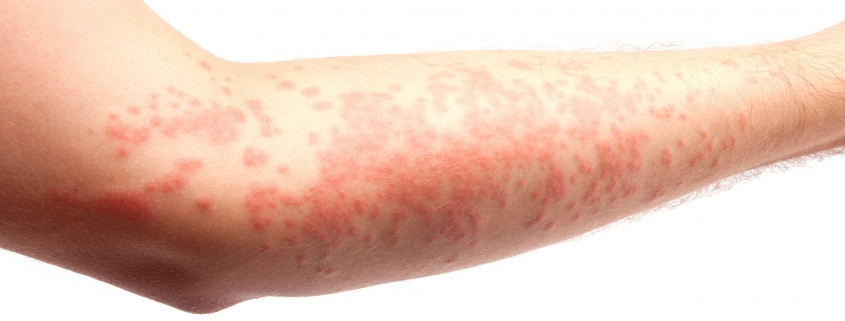
Skin Rashes
Skin rashes: allergic skin conditions can take several forms and are due to various causes.
Hives (urticaria), are red, itchy swollen areas of the skin that can range in size and appear anywhere on the body. Approximately 25% of the U.S. population will experience an episode of hives at least once in their lives. Most common causes of acute hives are viral infection, medication, food or latex. These cases of hives usually go away spontaneously once the triggering item is eliminated. Some people have chronic hives that occur almost daily for months to years. Forty percent of patients with chronic hives will have at least one more episode of chronic hives in their lifetime.
Angioedema, a swelling of the deeper layers of the skin and sometimes occurs with hives. Angioedema is not red or itchy, and most often occurs in soft tissue such as the eyelids and lips.
This swelling often accompanies hives as a result of chemical called histamine being released from the body in the deeper layers of skin.
Contact dermatitis, when some substances come in contact with skin, they may cause a rash called contact dermatitis. Some of these reactions are the result of an allergic reaction that involves the immune system, but many are the result of a non-allergic or irritant reaction. Often it is difficult to tell the difference between these two types of reactions
Eczema (atopic dermatitis) is a common allergic reaction often affecting the face, inside the elbows, and behind the knees. This red, scaly, itchy rash is usually seen in young infants and children, but can occur later in life. Individuals with eczema usually have a family history of allergic disease such as asthma or allergic rhinitis “hay fever”.
When you have an unusual rash, make sure to contact your allergist, who will work with you to determine its cause-whether allergies, irritants or another trigger. Most importantly, your physician and other health care providers can offer a support system and assist you in developing a skin care plan to manage your skin condition.
To make an appointment for a consultation or treatment, call Dr. Michael McCormick’s office at (530) 888-1016.
